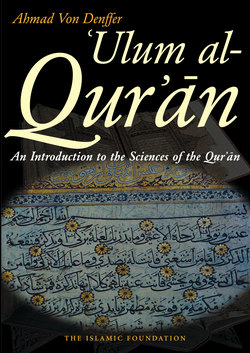Читать книгу Ulum al Qur'an - Ahmad Von Denffer - Страница 5
На сайте Литреса книга снята с продажи.
ОглавлениеIn the Name of Allah, the Merciful, the Mercy-giving.
Preface
The Qur’ān, while being revealed, was a living event for those who heard it. It was a part of their lives; rather the life itself, and not merely a book. One hardly needs a whole lot of external aids to understand one’s own life. However, the words that were alive were also being written down; becoming the Book. Some loss is inevitable in such a process – the text no more remains as alive, as understandable, for all the subsequent hearers as for the first – yet there is no alternative to it. For without having been written down, the priceless treasure could not have been transferred from one generation to another. But a written text, over time, stands in need of more and more external aids to make itself clear. It was therefore natural and inevitable that various branches of knowledge centred around the Qur’ān should have arisen to help in understanding it.
It was in the lifetime of the Prophet himself, blessings and peace be upon him, that the development of disciplines and branches of knowledge which were related to the understanding of the Qur’ān and considered necessary for this purpose – what we call the ‘ulūm al-qur’ān – began. The need to understand what the various words and texts correctly and fully meant was present from the very beginning; thus the rudiments of exegesis (tafsīr) and lexicon (mufradāt, gharā’ib, lugha) were laid. Gradually the range of questions became wider and wider. What was revealed when and where? On what occasion and under what circumstances? Were variant readings permissible; and, if permissible, what were those? Which verses superseded which? How was the Qur’ān arranged and how was it gathered? These are only some of the questions which were raised and answered. Around these answers developed the ‘ulūm al-qur’ān.
Writing books was the hallmark of Islamic culture; the ‘ulūm al-qur’ān were no exception. Books on various aspects began to be compiled in the very first century of Hijra; for example, the first books on tafsīr are attributed to the Companions, Ubay ‘Ibn Ka‘b and ‘Abdullāh Ibn ‘Abbās, and to Sa‘īd Ibn Jubair (d. 93H); ‘Ikrima (d. I07H) wrote on the reasons and circumstances of revelation. By the end of the third century, a very large number of books appear to have been written, but none of them were comprehensive and all of them are not extant. The need of a systematic, comprehensive compilation must have been felt. The first such work is reported to have been written by Abū Bakr Muḥammad Ibn Khalaf (d. 309H) in 27 volumes, known as al-ḥādī fī ‘ulūm al-qur’ān, but the first extant book is that of Burhānuddīn Zarkashī (d. 794H), al-burhān fī ‘ulūm al-qur’ān. This was followed by Jalāluddīn Suyūṭī’s (d. 911H) al-itqān fī ‘ulūm al-qur’ān, based mostly on Zarkashī’s al-burhān. Suyūṭī’s al-itqān serves as a standard source book on the ‘ulūm al-qur’ān.
However, there was no book in English language on this subject. Brother Ahmad Von Denffer has therefore rendered a great service by compiling the first English book, which fills a very serious and deeply felt gap. An average English reader, especially a student, who has no access to an Arabic text like al-itqān, had nothing to help him in understanding the Qur’ān. Ahmad’s book should now provide valuable assistance to him in his task.
I believe that one can still absorb the message of the Qur’ān without any external aid, if one goes to it in an appropriate way. But to understand the meaning of all the verses without a knowledge of the ‘ulūm al-qur’ān would be well-nigh impossible. Hence the information provided by Ahmad Von Denffer should prove indispensible to anyone who cannot reach the Arabic sources. It is precise, brief, yet quite comprehensive.
I am happy that the Islamic Foundation is publishing such a useful work. I pray to Allah subḥānahū wa ta‘ālā to accept our humble efforts and to grant us His mercy and forgiveness.
| Dhū al-Qa‘da 1403 | Khurram Murad |
| August 1983 | Director General |
| Leicester, U.K. |
